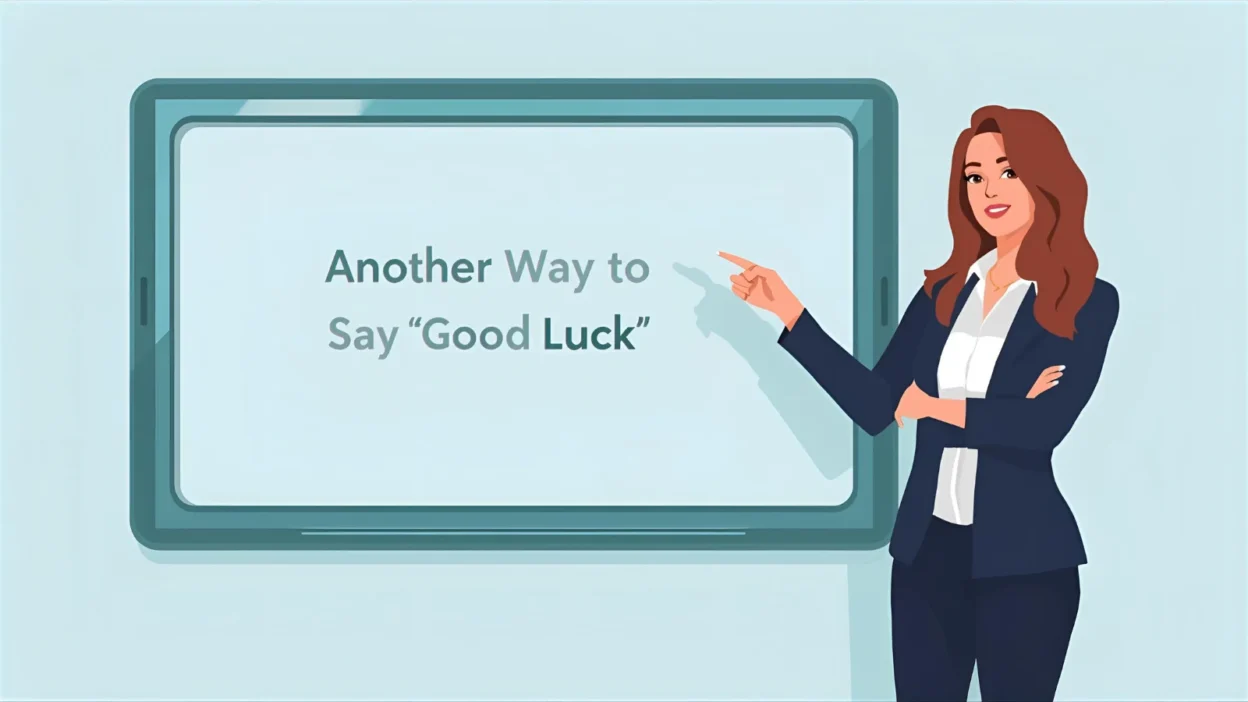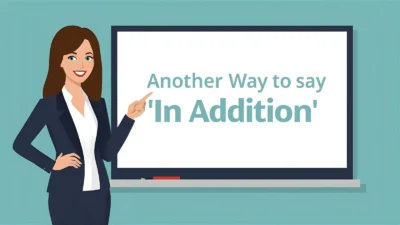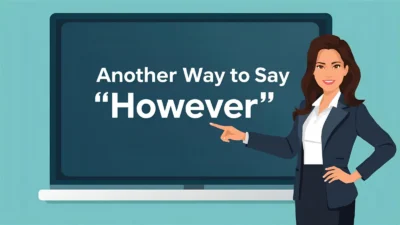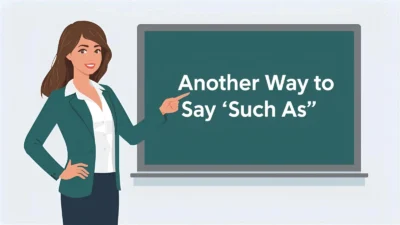The phrase “good luck” is one of the most common ways to wish someone success, encouragement, or positivity before they face a challenge. Whether it’s before an exam, a job interview, a big game, or even a life change, we use “good luck” to show care and support. However, repeating it can sometimes sound generic or impersonal. Luckily, there are plenty of alternatives that can add warmth, creativity, and variety to your words.
In this article, you’ll discover 25 meaningful alternatives to “good luck,” each with its meaning, detailed explanation, usage example, best use, and tone.
1. Best of luck
Meaning: A slightly warmer version of “good luck.”
Detailed Explanation: Simple, classic, and versatile.
Scenario Example: Best of luck with your presentation today!
Best Use: Everyday conversations, casual support.
Tone: Friendly, supportive.
2. Wishing you success
Meaning: Expresses hope for someone’s positive outcome.
Detailed Explanation: More formal than “good luck.”
Scenario Example: Wishing you success in your upcoming exams.
Best Use: Academic, professional contexts.
Tone: Polished, encouraging.
3. Fingers crossed
Meaning: Expresses hope that things turn out well.
Detailed Explanation: Informal, playful way of wishing luck.
Scenario Example: Fingers crossed you get the job!
Best Use: Friends, casual conversations.
Tone: Light, hopeful.
4. Knock ’em dead
Meaning: Encourages someone to perform impressively.
Detailed Explanation: Energetic, motivational phrase.
Scenario Example: You’ve practiced so much—go knock ’em dead on stage!
Best Use: Performances, presentations, competitions.
Tone: Bold, energetic.
5. You’ve got this
Meaning: Shows confidence in someone’s ability.
Detailed Explanation: Focuses on their capability rather than chance.
Scenario Example: Don’t stress—you’ve got this!
Best Use: Exams, interviews, challenges.
Tone: Empowering, reassuring.
6. Break a leg
Meaning: Traditional phrase wishing performers success.
Detailed Explanation: Common in theatre, but now widely used.
Scenario Example: Break a leg at your audition today!
Best Use: Performances, artistic endeavors.
Tone: Playful, traditional.
7. All the best
Meaning: A versatile phrase expressing goodwill.
Detailed Explanation: Can be formal or casual depending on context.
Scenario Example: All the best with your new job!
Best Use: General situations, farewells, milestones.
Tone: Neutral, adaptable.
8. I’m rooting for you
Meaning: Shows active support.
Detailed Explanation: Suggests encouragement and solidarity.
Scenario Example: I’m rooting for you in the finals!
Best Use: Competitions, personal challenges.
Tone: Warm, enthusiastic.
9. Hope it goes well
Meaning: Expresses gentle optimism.
Detailed Explanation: Polite and caring, but less formal.
Scenario Example: Good luck with the meeting—I hope it goes well.
Best Use: Everyday situations.
Tone: Friendly, casual.
10. Go smash it
Meaning: Urges someone to perform excellently.
Detailed Explanation: Energetic and modern slang.
Scenario Example: Go smash it at your interview!
Best Use: Casual, motivational.
Tone: Bold, upbeat.
11. Sending you positive vibes
Meaning: Expresses encouragement with a light, modern twist.
Detailed Explanation: Popular in casual, friendly communication.
Scenario Example: Sending you positive vibes for your big day!
Best Use: Social, informal wishes.
Tone: Cheerful, uplifting.
12. May fortune favor you
Meaning: A more poetic version of “good luck.”
Detailed Explanation: Formal and slightly dramatic.
Scenario Example: May fortune favor you in this new venture.
Best Use: Ceremonial, formal speeches.
Tone: Grand, formal.
13. Here’s to your success
Meaning: A celebratory way of wishing luck.
Detailed Explanation: Suggests confidence in success.
Scenario Example: Here’s to your success in the competition!
Best Use: Toasts, formal encouragement.
Tone: Polished, positive.
14. Do your best
Meaning: Encourages effort, not just outcome.
Detailed Explanation: Motivates without pressuring.
Scenario Example: Just do your best, and that will be enough.
Best Use: Exams, stressful situations.
Tone: Supportive, caring.
15. Hope everything works out
Meaning: Expresses desire for a favorable outcome.
Detailed Explanation: Softer than “good luck.”
Scenario Example: Hope everything works out with the project deadline.
Best Use: General life events.
Tone: Kind, encouraging.
16. Here’s wishing you the best
Meaning: Warm, polite alternative.
Detailed Explanation: Slightly formal, flexible use.
Scenario Example: Here’s wishing you the best for your new journey.
Best Use: Greetings, well-wishes.
Tone: Warm, respectful.
17. Crush it
Meaning: Modern slang urging excellence.
Detailed Explanation: Short, energetic, and motivational.
Scenario Example: Go crush it on stage tonight!
Best Use: Informal, competitive settings.
Tone: Bold, casual.
18. May the odds be in your favor
Meaning: Playful, pop-culture-inspired wish.
Detailed Explanation: Popularized by The Hunger Games.
Scenario Example: May the odds be in your favor for tomorrow’s contest.
Best Use: Lighthearted, fun encouragement.
Tone: Playful, humorous.
19. Hope you nail it
Meaning: Wishing someone’s effort to be perfect.
Detailed Explanation: Slang-based, informal.
Scenario Example: Hope you nail it in your final round interview.
Best Use: Casual, performance-oriented.
Tone: Energetic, supportive.
20. May success be with you
Meaning: Formal blessing-like wish.
Detailed Explanation: Poetic and uplifting.
Scenario Example: May success be with you in this competition.
Best Use: Ceremonial, motivational contexts.
Tone: Formal, grand.
21. Give it your all
Meaning: Encourages full effort.
Detailed Explanation: Focuses on input rather than outcome.
Scenario Example: Just give it your all, and you’ll do great.
Best Use: Sports, exams, challenges.
Tone: Motivational, caring.
22. Hope you shine
Meaning: Encourages someone to stand out positively.
Detailed Explanation: Poetic, uplifting alternative.
Scenario Example: Hope you shine in your performance tonight.
Best Use: Artistic or social occasions.
Tone: Warm, poetic.
23. I believe in you
Meaning: Expresses confidence in someone’s abilities.
Detailed Explanation: Shifts focus from chance to personal trust.
Scenario Example: Don’t worry, I believe in you—you’ll do great.
Best Use: Personal encouragement, close relationships.
Tone: Reassuring, heartfelt.
24. Wishing you all the best of luck
Meaning: Stronger version of “good luck.”
Detailed Explanation: A warm and versatile option.
Scenario Example: Wishing you all the best of luck with your new job.
Best Use: Formal and casual situations.
Tone: Supportive, universal.
25. You’re going to do great
Meaning: Expresses certainty in someone’s success.
Detailed Explanation: Combines reassurance with encouragement.
Scenario Example: Don’t stress—you’re going to do great tomorrow.
Best Use: Exams, interviews, performances.
Tone: Positive, uplifting.
Conclusion
While “good luck” is simple and widely understood, using alternatives can make your message more personal, heartfelt, or powerful. Whether you say “you’ve got this” to empower, “fingers crossed” to show solidarity, or “wishing you success” for a polished touch, each option adds variety and warmth. These 25 alternatives allow you to adapt your words for casual chats, professional settings, or emotional encouragement—making your wishes more meaningful every time.



